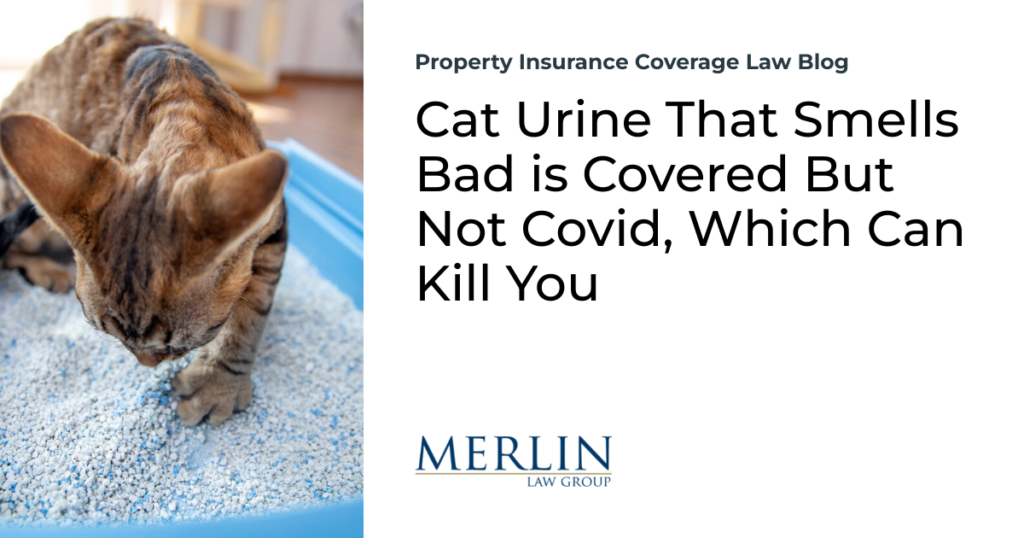Cat Urine That Smells Bad is Covered But Not Covid, Which Can Kill You

I once had three indoor black cats. One or two of them began to urinate on the furniture. After paying over $20,000 to replace the furniture, the cats became outdoor cats. Cat urine is simply foul smelling and cannot be tolerated.
The New Hampshire Supreme Court presumably appreciated this when ruling that cat urine odor constituted physical loss or damage in Mellin v. Northern Security Insurance Co., 167 N.H. 544 (2015). I have argued that if cat odor, which merely smells bad, is covered, then Covid, which can kill you, must constitute physical loss or damage.
Unfortunately, in a recent decision, the New Hampshire Supreme Court distinguished how cat urine odor could constitute physical loss or damage, but not Covid.1 Regarding the cat urine, the court noted:
The plaintiffs in Mellin sought to recover under their homeowner’s policy after their condominium was significantly affected by a cat urine odor emanating from a unit below….The insureds and their tenant temporarily moved out of the unit at different times due to the odor. Remediation proved unsuccessful; the plaintiffs ultimately sold the condominium and claimed that the sales price was reduced because of the odor….The plaintiffs brought a declaratory judgment action against their insurer, asserting that the insurer was required to reimburse them for losses to their condominium caused by the cat urine odor…The policy at issue ‘insure[d] against risk of direct loss to property . . . if that loss is a physical loss to property.’…
The trial court granted summary judgment to the insurer after finding that the cat urine odor did not satisfy the ‘physical loss’ requirement, and the homeowners appealed. Id. We vacated that ruling, noting that while some jurisdictions had adopted a limited interpretation of ‘physical loss,’ others recognized that an insured may suffer a ‘physical loss’ in the absence of structural damage to property. We held that:
[P]hysical loss may include not only tangible changes to the insured property, but also changes that are perceived by the sense of smell and that exist in the absence of structural damage. These changes, however, must be distinct and demonstrable. Evidence that a change rendered the insured property temporarily or permanently unusable or uninhabitable may support a finding that the loss was a physical loss to the insured property….
While we adopted a ‘distinct and demonstrable alteration’ standard in Mellin, we did not hold that the odor of cat urine in the property was necessarily sufficient to meet that standard….Rather, we remanded the case for the application of that standard…We also cautioned that ‘the term ‘physical loss’ should not be interpreted overly broadly,’ and cited a federal appeals court decision recognizing that direct physical loss or damage cannot be interpreted to apply ‘ ‘whenever property cannot be used for its intended purpose.’ ‘…(quoting Pentair v. American Guarantee and Liability Ins., 400 F.3d 613, 616 (8th Cir. 2005)….
The plaintiffs argue that the presence of SARS-CoV-2 on property, whether by aerosolized particles suspended in the air, or by fomites that come to rest on surfaces, alters property that is safe and usable into property that is dangerous and unusable. According to the plaintiffs, this alteration is ‘distinct’ because anyone presented with property that is contaminated with SARS-CoV-2 and other property that is not would choose the latter. The plaintiffs assert that the alteration is ‘demonstrable’ through testing and modeling used to identify where the virus is present. The trial court agreed with the plaintiffs that the change to the property was ‘distinct’ because people coming into contact with property exposed to the virus results in a risk of contracting a deadly disease.
… While a ‘distinct and demonstrable’ physical alteration need not necessarily be visible and alterations at microscopic levels might in certain circumstances meet this threshold, the mere adherence of molecules to surfaces does not alter the property in a distinct and demonstrable manner. Columbiaknit, Inc. v. Affiliated FM Ins. Co., No. Civ. 98-434-HU, 1999 WL 619100, at *6 (D. Or. Aug. 4, 1999) (finding that when clothing must be cleaned to remediate an odor and cannot be sold as new, there is covered property damage, but that when ‘a mere washing’ would remove odor from a piece of clothing whose newness was not part of its value, there was no ‘distinct and demonstrable’ damage to property). As has been noted by a number of courts, the virus can be cleaned from surfaces, and it eventually disintegrates on its own.
Insurance commentator Bill Wilson argued in part that Covid would not be covered because it could easily be cleaned and removed. I can appreciate from personal experience that cat urine odor is not easily cleaned and removed. This distinction is what the New Hampshire Supreme Court perceived as well.
The Covid legal battles have almost universally been won by insurers with American forms. This is another legal win for the insurance industry and seems to doom my cat urine odor rhetoric.
Thought For The Day
Women and cats will do as they please, and men and dogs should relax and get used to the idea.
—Robert A. Heinlein
1 Schleicher & Stebbins Hotels v. Starr Surplus Lines Ins. Co., No 2022-0155 (N.H. May 11, 2023).







